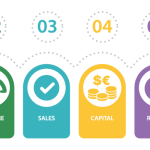Functional programming is style of programming language, which uses the concepts of mathematical functions. A function in mathematics should always produce the same result on receiving the same argument. In procedural languages, the flow of the program runs through procedures, i.e. the control of program is transferred to the called procedure. While control flow is transferring from one procedure to another, the program changes its state.
In procedural programming, it is possible for a procedure to produce different results when it is called with the same argument, as the program itself can be in different state while calling it. This is a property as well as a drawback of procedural programming, in which the sequence or timing of the procedure execution becomes important.
Functional programming provides means of computation as mathematical functions, which produces results irrespective of program state. This makes it possible to predict the behavior of the program.
Functional programming uses the following concepts:
● First class and High-order functions – These functions have capability to accept another function as argument or they return other functions as results.
● Pure functions – These functions do not include destructive updates, that is, they do not affect any I/O or memory and if they are not in use, they can easily be removed without hampering the rest of the program.
● Recursion – Recursion is a programming technique where a function calls itself and repeats the program code in it unless some pre-defined condition matches. Recursion is the way of creating loops in functional programming.
● Strict evaluation – It is a method of evaluating the expression passed to a function as an argument. Functional programming has two types of evaluation methods, strict (eager) or non-strict (lazy). Strict evaluation always evaluates the expression before invoking the function. Non-strict evaluation does not evaluate the expression unless it is needed.
● λ-calculus – Most functional programming languages use λ-calculus as their type systems. λ-expressions are executed by evaluating them as they occur.
Common Lisp, Scala, Haskell, Erlang and F# are some examples of functional programming languages.



Comments are closed